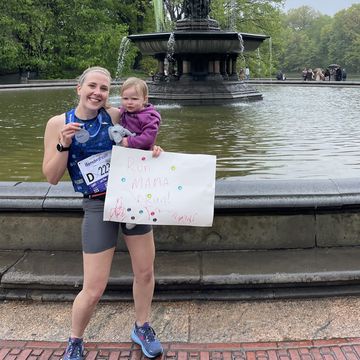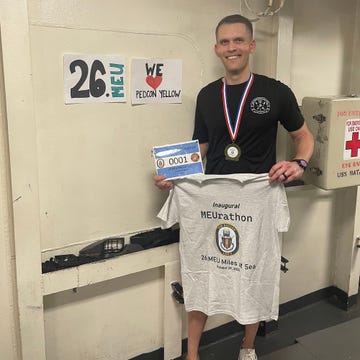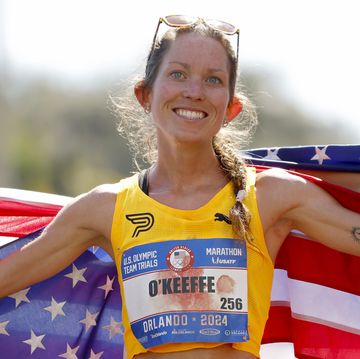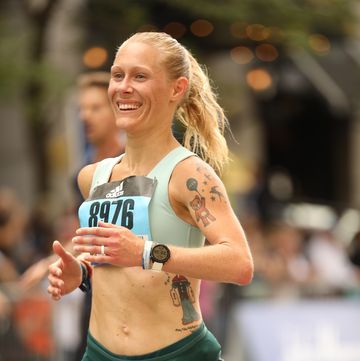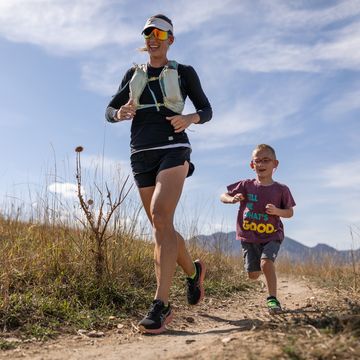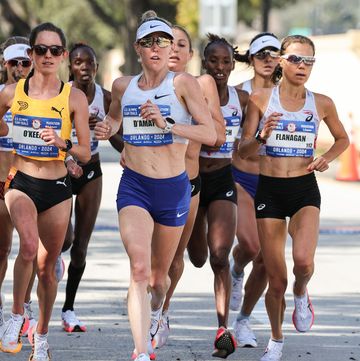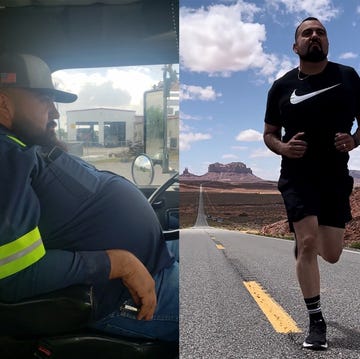Charlie Engle is no stranger to a challenge. The 46-year-old endurance runner turned his life around from being a drug and alcohol addict to living sober since 1992. He refocused his addictive personality toward running, eventually entering marathons, then ultramarathons, adventure races and self-created endurance missions. His latest: Running across the Sahara Desert.
In February, 2007, Charlie and teammates Ray Zahab and Kevin Lin became the first people in history to run across the entire Sahara Desert, covering over 4,300 miles in what became a 111 consecutive day effort.
The movie documenting their feat, "Running the Sahara" (produced by James Moll and narrated by Matt Damon), was recently released on DVD. It's an incredible summation of what was surely one of the most difficult running challenges anyone's ever set out to do.
We caught up with Charlie, now a motivational speaker and television producer, at the Big Sur Marathon where he was showing "Running the Sahara" and running Big Sur for fun (clocking a cool 3:25 on the course).
Where did the idea to run across the Sahara come from?
Kevin, Ray and I were racing against each other in the Jungle Marathon, a 125-mile race through the Amazon at the end of 2004. Ray had just done the Trans 333 in Niger [a 333-kilometer race]. He loves the desert, and said to me, "Hey I don't think anyone's ever run across the Sahara, are you interested?" And I was like, "Ya, sure!"
We found no evidence of anyone ever doing it before, something that's almost unheard of in this day and age because people are always tackling the next thing. I mean, I've joked about doing Badwater on a pogo stick with my arms tied behind my back, just to be the first person to do it. But running across the Sahara—that was a straightforward thing.
We estimated it would be about 3,000 miles, but it ended up being a little over 4,600 miles. The maps and details just don't exist.
How did it then come together?
I'll be honest, I never actually believed it was going to happen. It started as one of those crazy ideas that you get to take ownership of, but the reality usually is that it's probably never going to happen so you don't have to worry really about it.
We did a scouting trip in October, 2005. I had been so focused on the planning, getting the sponsorship dollars and everything, that I kind of forgot about the physical aspect of it.
Then one day I had James Moll and Matt Damon involved in the project. I woke up one morning about five months before we left and said, "Oh shit. I actually have to run across this desert."
So how did your training change?
Ray is a personal trainer—that's his background, so I let him create the program. I do almost everything based on time instead of mileage, but my training really picked up an incredible amount. I reached a point where I was running as much as 25 and 30 hours per week. At a 10-minute pace (I'd normally be running faster than that), I was doing 200-mile weeks at a minimum for about four months. Before that, getting ready for races like Badwater, I was probably running half of that ... like 10-12 hours a week. More than anything else I needed to be able to get up and do this day after day after day. Ray had me doing back-to-back days of four-hour runs, three to four days in a row. A couple months before we left, I did 10 days in a row running four hours a day.
And what about your nutrition while training, and then during the expedition?
I had to adjust the nutrition leading up to the run. I tried to teach my body how to eat and process 5, 6, 7,000 calories a day. Your body would just shut down if you tried that right away. Here in the U.S. I ate anything I could get my hands on, like chocolate cake and ice cream. I ate everything and anything I wanted for the month before we left for Africa. I gained 10 extra pounds, even with all the training.
But immediately when we got to Africa, it was obvious we wouldn't be able to keep that up, due to what was available to us. We consumed 2,000 calories a day in Gatorade, 3,000 calories in food. I needed more like 8 to 10,000 to maintain my weight. It was rough. There's no refrigeration there, so the goat in the back of the truck in the morning is in the pot in the evening. That was really distressing to me.
I had to say to our cook at one point that I just could not eat any more couscous, any more goat. We got camel meat a few times, and that tasted better.
You lost a considerable amount of weight, right?
I lost nearly 40 pounds at the maximum. The interesting thing is that I gained seven or eight pounds back in the last few weeks. My body reached it's tipping point, and started holding on to the food. My metabolism adjusted.
How much walking did you do?
We kept track of all of it on GPS, and were averaging under 10-minute miles for the whole run. We only walked about one percent of the total (50 miles or so of the whole amount). We'd walk in the morning for 15 minutes, start our morning in the dark talking into tape recorders audio journal. I recognized that no other way would we have the energy to journal during these days, so this is how we documented our thoughts and feelings.
How is it going through those journals now, in retrospect?
I am shocked at how much detail and how deep my thoughts really were. Actually, my level of anxiety is what really shocks me. At those times, talking to myself, I was really full of anxiety. I felt really responsible. I had dragged five other people and about 20 camera crews and native Tuaregs out here, and I was thinking, "This is a disaster." I genuinely felt I had hoodwinked all these people to come out to the desert. I was desperate. I didn't tell Ray or Kevin. All I said every day was, "Everything's going to be fine." Meanwhile, I'm thinking, "Oh my god, are we going to survive this? Are we going to get across this desert?"
I admit that ego came into play. It was like, "This is going to be so embarrassing if we're back home in a couple of weeks. I'll never get another sponsor, no one will ever listen to me."
But, ya, I used the tape recorder as a therapist.
Anything tremendously physically challenging can leave you feeling raw. How did that play out?
There was no buffer zone. Any emotion I had basically happened real time without any holding back. Sometimes that was really funny. We had some incredibly moving moments. There were times where we're all three in tears ... while we were running through villages and these kids are coming out to see us, or we'd be crying because we got some really good cookies and we were so grateful about it. It's amazing what small things would really make our day.
But, as far as things I say in the film, my addictive nature was in full swing out there. I took everything personally. I took it to heart when something didn't go well, like if we didn't have enough food or water, or if the truck got a flat tire. I felt like everything out there was my responsibility.
What part of your body hurt the most?
I had tendonitis in my right shin, like a shin splint on steroids. That scared me the most. Ray had the same thing. Tendonitis doesn't go away, especially while you're trying to run 50 miles a day.
On the last day, I had a horrendous staph infection going on within this blister on the bottom of my foot. While running, it burst. It was gross, and I felt it squishing around, but it relieved so much pressure that I could actually run.
There's some controversy insinuated in the film on that last day, making it look like you were trying to leave your teammates when you felt good. What do you say about that?
It is the craziness of an expedition to think that I would ever leave them. It became their fear. I think the thought manifested in them that it was something I might do. But, look, I'm a TV producer by trade. I knew without having to be told that we needed to finish in daylight. I knew that the last thing I wanted to do was spend another night out there so I could run the last five miles in daylight.
My blister popped, and I started running again, knowing they'd catch up. But showcasing it like I would try to leave them creates a little more intrigue.
Are you surprised you guys made it?
Like life, our happiness, our fulfillment, our serenity is all based on our ability to adjust to the changing circumstances. Every single day I woke up as expedition leader, I said, "Ok, here's our plan." Not one time did it ever go anywhere close to as planned.
We did not have many good days out of those 111 days. Eleven of them, at most, were what I would call healthy days where not one of us was in distress. We'd run out of food, water, get lost, have a fight, someone would have hurt feelings. It was incredibly rare that something didn't impact how we progressed. It was all about how we would adapt.
It was almost just two of you finishing, and not three. Can you talk about that?
Kevin wanted to quit. He's younger, and there were many, many days where we were running along with no purpose, where we might have been going in the wrong direction. We truly ran for two weeks between Niger and Libya when we didn't have any idea if we were going to get to continue if Libya wouldn't let us in. It's like knowing there are layoffs, and your boss asks you to start a new project. We had to get up and run 50 miles every day without knowing if we were going to be able to continue. I convinced Kevin that we had to keep trying as hard as we could. It's something I learned from adventure racing. Don't ever pull yourself from the course. Go until you couldn't go, because something might change, the cutoff times or rules or whatever. You keep going.
Hell, I even had a crazy plan that, if Libya didn't let us in, we were going to run up to Algeria, Tunisia, see if we could find a ship, run around the deck in a circle while the ship sailed around Libya and then get off and finish. They thought I was crazy, but I was totally serious.
I wasn't going to live the rest of my life wishing we went as far as we could.


